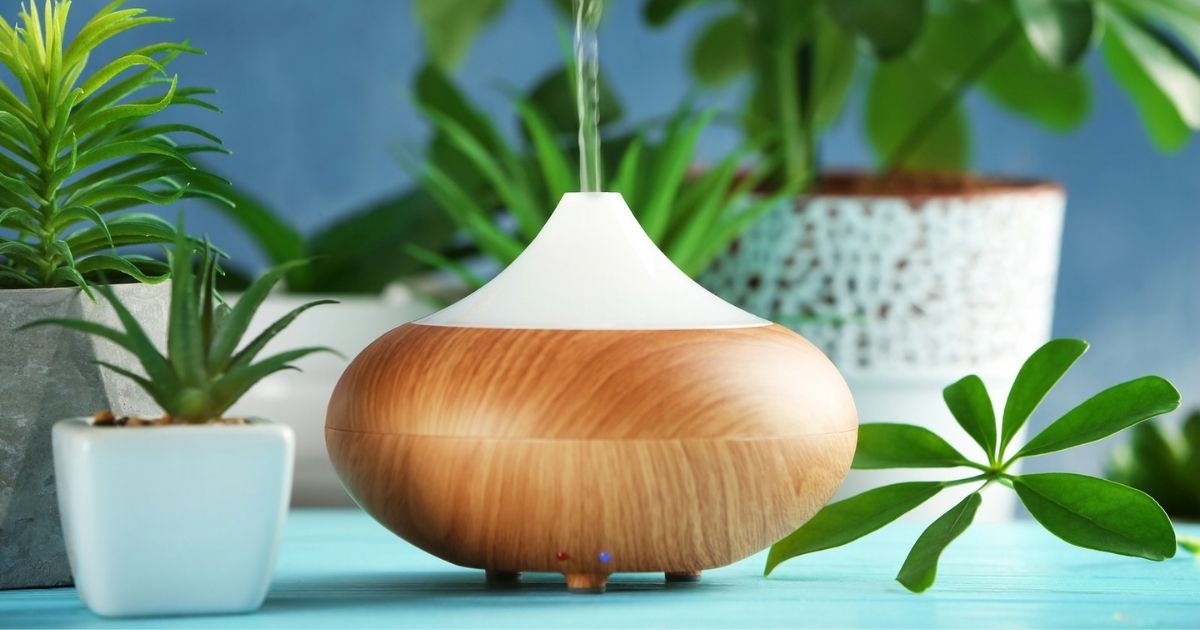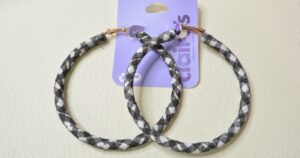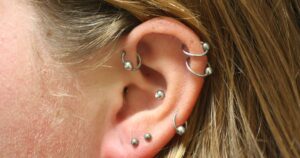Discover the intriguing world of infusing your space with captivating perfume aromas in your diffuser. Can I put perfume in my diffuser? This question sparks curiosity and invites exploration. In this article, we will delve into the safety concerns, benefits, and potential risks of using perfume in your diffuser. We will also provide alternative ways to scent your diffuser and offer tips for using perfume safely and effectively. Join us as we unlock the secrets of personalized scent experiences and create your own signature blends.
Key Takeaways
- Perfumes contain synthetic chemicals that can irritate the respiratory system and may trigger allergies or asthma attacks.
- Certain perfumes may contain alcohol, which can be flammable and pose a fire hazard when used in a diffuser.
- Compatibility between perfume and diffusers should be carefully considered to prevent damage to the diffuser and ensure safety.
- Alternative fragrance options such as essential oils, aromatherapy blends, and fragrance oils can be used in diffusers as a safer option to avoid potential risks associated with perfume.
The Safety Concerns of Using Perfume in a Diffuser
Explored in this section are the safety concerns associated with using perfume in a diffuser. While it may be tempting to add your favorite fragrance to your diffuser, there are several risks to consider. Perfumes contain various synthetic chemicals that may not be suitable for inhalation. These chemicals can irritate the respiratory system, cause allergies, or trigger asthma attacks. Additionally, certain perfumes may contain alcohol, which can be flammable and pose a fire hazard when used in a diffuser.
Understanding the Composition of Perfume and Its Compatibility With Diffusers
Understanding the composition of perfume and its compatibility with diffusers is essential for ensuring both safety and effectiveness. Perfume is typically composed of a combination of essential oils, fragrance compounds, and alcohol, which can potentially react with the materials in a diffuser. It is important to consider the potential risks of chemical reactions and explore alternative fragrance options that are specifically designed for diffusers to achieve the desired scent without compromising safety.
Perfume Diffusion Safety
Perfume composition plays a crucial role in determining its compatibility with diffusers. Understanding the safety aspects of perfume diffusion is important to ensure a pleasant and safe experience. Here are three key considerations:
- Alcohol content: Most perfumes contain alcohol, which can be flammable and may damage diffusers. Look for alcohol-free alternatives or diluted versions specifically designed for diffusers.
- Oil-based perfumes: Some perfumes are oil-based, which can clog diffuser mechanisms. Opt for water-based perfumes or essential oils that are specifically formulated for diffusers.
- Synthetic ingredients: Certain synthetic ingredients in perfumes may not be suitable for diffusion due to their chemical composition. Look for natural and organic perfumes to avoid any potential risks.
Chemical Reactions Possible
When considering the compatibility of perfume with diffusers, it is important to be aware of the potential chemical reactions that can occur. Perfumes are complex mixtures of various chemicals, including aromatic compounds, solvents, and fixatives. These chemicals can interact with the materials used in diffusers, such as plastic or metal, leading to undesirable reactions. For example, certain perfume ingredients can corrode plastic or degrade metal, compromising the performance and safety of the diffuser. Understanding the composition of perfume and its compatibility with diffusers is crucial to ensure a pleasant and safe diffusion experience.
Alternative Fragrance Options
Occasionally, users of diffusers may seek alternative fragrance options due to concerns about the composition of perfume and its compatibility with diffusers. Here are three alternative fragrance options to consider:
- Essential Oils: These natural extracts from plants offer a wide range of fragrances and therapeutic benefits.
- Aromatherapy Blends: These are mixtures of essential oils carefully crafted to create specific moods or address specific concerns.
- Fragrance Oils: These synthetic oils are specifically designed for use in diffusers and offer a wide variety of scents.
Exploring the Benefits of Infusing Your Space With Perfume Aromas
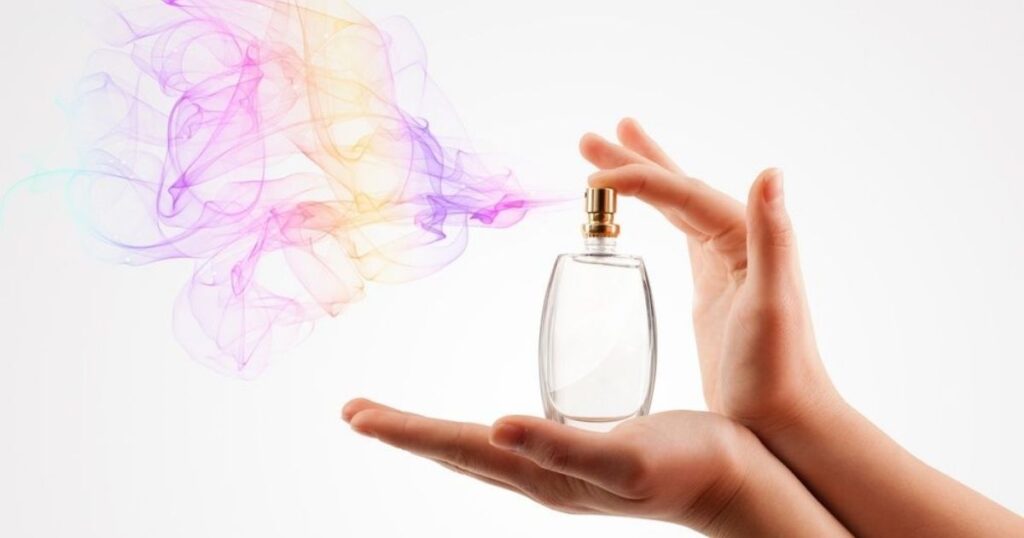
One of the key advantages of infusing your space with perfume aromas is the multitude of benefits it can provide for your overall well-being. Perfume aromas have the power to enhance your mood, promote relaxation, and reduce stress. The scents can also improve focus and concentration, boost creativity, and uplift your spirits. Additionally, perfume aromas can create a welcoming and inviting atmosphere, making you feel more connected and at ease in your space.
The Potential Risks and Side Effects of Putting Perfume in a Diffuser
The use of perfume in a diffuser can pose potential risks and side effects that should be carefully considered. Here are three important factors to keep in mind:
- Allergic reactions: Perfumes often contain various chemicals and ingredients that can trigger allergies, leading to symptoms like skin irritation, respiratory issues, and headaches.
- Toxicity: Some perfumes may contain harmful substances like phthalates, which can have adverse effects on health when inhaled or absorbed through the skin.
- Damage to the diffuser: The concentration of perfume oils can be too strong for a diffuser, potentially causing clogging, corrosion, or malfunctioning of the device.
It is crucial to prioritize safety and choose suitable essential oils or fragrance oils specifically designed for diffusers to avoid these risks.
Alternative Ways to Scent Your Diffuser for a Personalized Experience
Several individuals prefer to experiment with different scents and methods to personalize their diffuser experience. Apart from using perfume, there are alternative ways to scent your diffuser. Essential oils are a popular choice, offering a wide range of scents and therapeutic benefits. You can also try using dried herbs, like lavender or rosemary, or citrus peels for a refreshing aroma. Experimenting with different combinations can help create a personalized and enjoyable diffuser experience.
Tips and Tricks for Using Perfume in Your Diffuser Safely and Effectively
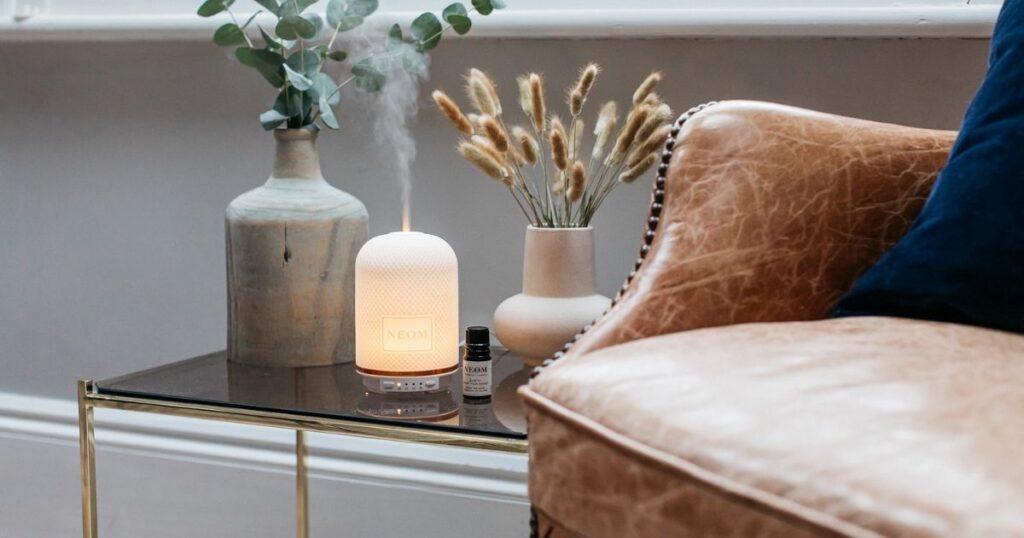
To ensure a safe and effective use of perfume in your diffuser, it is important to follow these tips and tricks:
- Choose the right perfume: Look for perfumes that are made with natural ingredients and do not contain any harmful chemicals or additives. This will ensure a pleasant and safe aroma when diffused.
- Dilute the perfume: Perfumes are usually highly concentrated, so it is best to dilute them before putting them in your diffuser. Mix a few drops of perfume with water or a carrier oil to create a milder scent.
- Clean your diffuser regularly: Perfumes can leave residues in your diffuser, so make sure to clean it regularly to prevent any buildup. Use a mild soap and warm water to clean the diffuser, and rinse thoroughly before using it again.
DIY Perfume Blends for Diffusers: Creating Your Own Signature Scents
Creating your own signature scents for your diffuser can be a fun and personal way to enhance your aromatic experiences at home. By experimenting with different combinations of essential oils, you can create unique blends that suit your preferences and mood. Whether you prefer a calming and relaxing scent or a refreshing and invigorating aroma, DIY perfume blends for diffusers allow you to customize your fragrance and enjoy a truly personalized sensory experience.
Essential Oil Combinations
When exploring essential oil combinations for diffusers, one can experiment with various scents to create their own unique signature blends. Here are three essential oil combinations that you can try in your diffuser:
- Calming Blend: Combine lavender, chamomile, and bergamot essential oils for a soothing and relaxing aroma.
- Energizing Blend: Mix peppermint, lemon, and rosemary essential oils to create an invigorating and refreshing scent.
- Floral Blend: Blend geranium, ylang-ylang, and jasmine essential oils for a floral and uplifting fragrance.
Personalized Aromatic Experiences
How can you achieve personalized aromatic experiences by creating your own signature scents for diffusers? By blending different essential oils, you can create unique and customized fragrances that resonate with your individual preferences and desires. Experiment with various combinations, such as floral and citrus notes or woody and spicy undertones, to find the perfect blend that speaks to your senses. Creating your own signature scents allows you to create a sense of belonging and ownership over your aromatic experiences.
Considerations Before Experimenting With Perfume in Your Diffuser
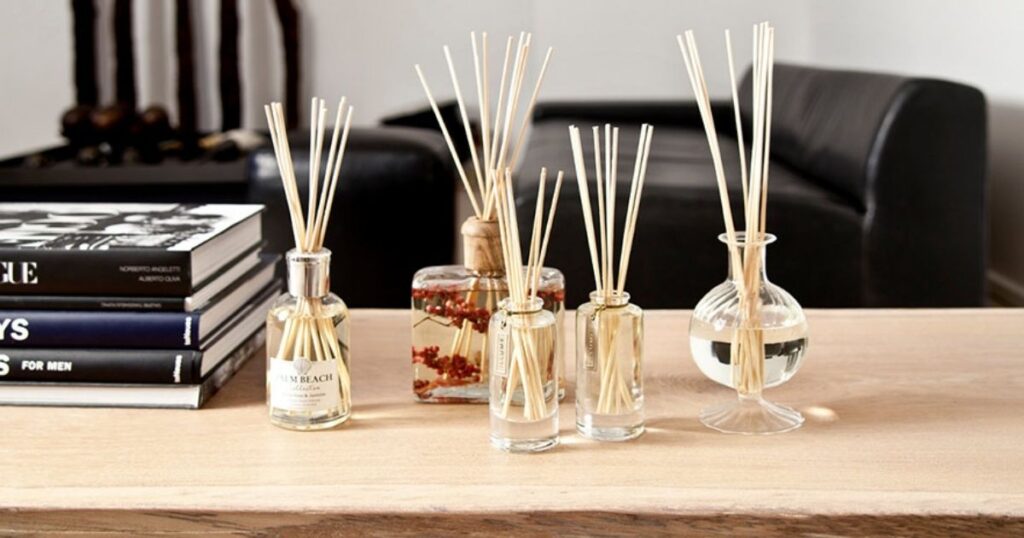
Before proceeding with the use of perfume in your diffuser, it is important to carefully consider the potential implications and effects it may have on the device and your overall experience. Here are three key considerations to keep in mind:
- Compatibility: Ensure that the perfume you plan to use is suitable for diffusing and won’t cause any damage to the diffuser or affect its functionality.
- Concentration: Perfumes are typically more concentrated than essential oils, so it’s crucial to dilute them properly to prevent overpowering scents or potential respiratory issues.
- Quality: Opt for high-quality perfumes that are free from harmful chemicals or additives, as these can negatively impact both your health and the performance of the diffuser.
Frequently Asked Questions
Can I Use Essential Oils Instead of Perfume in My Diffuser?
Using essential oils instead of perfume in a diffuser is a common practice. Essential oils offer a natural and aromatic alternative, providing various therapeutic benefits such as relaxation, stress relief, and mood enhancement.
How Often Should I Clean My Diffuser if I Use Perfume?
To ensure optimal performance and maintain the longevity of your diffuser, it is recommended to clean it regularly when using perfume. The frequency of cleaning depends on usage, but a general guideline is to clean it at least once a week.
Can I Mix Different Perfumes Together in My Diffuser?
Mixing different perfumes together in a diffuser is not recommended as it can create an unpleasant scent and potentially damage the diffuser. It’s best to use a single fragrance or essential oil for optimal results.
Will Using Perfume in My Diffuser Damage the Diffuser Over Time?
Using perfume in your diffuser may seem like a convenient way to add fragrance, but it can actually damage the diffuser over time. The oils in perfume can clog the diffuser and affect its functionality, leading to potential repairs or replacement.
Are There Any Specific Perfumes That Should Not Be Used in a Diffuser?
Certain perfumes may not be suitable for use in a diffuser due to their ingredients or composition. It is important to check the manufacturer’s guidelines or consult a professional to ensure the safe and effective use of perfumes in a diffuser.
Conclusion
In conclusion, while it may be tempting to put perfume in your diffuser, it is not recommended due to safety concerns and potential risks. Perfume is not designed to be used in a diffuser and its composition may not be compatible, leading to potential damage or malfunction. Instead, opt for alternative ways to scent your diffuser and consider creating your own signature scents with DIY perfume blends. Like a delicate breeze carrying captivating scents, these personalized aromas will infuse your space with a unique and enchanting fragrance.
